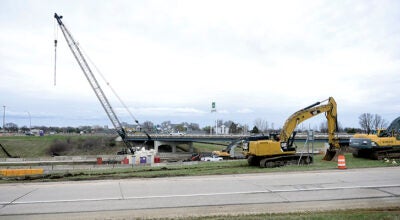Northern Country Coop cuts ribbon on new grain bin
Published 12:01 pm Saturday, June 6, 2020
|
Getting your Trinity Audio player ready...
|
On Wednesday, dignitaries cut the ribbon on Northern Country Coop’s new 100 foot diameter grain storage bin in Lansing that is the first phase of a larger vision.
Construction on the bin’s base was already under way. The project will also include a receiving pit that will have a leg capable of moving 20,000 bushels per hour to the bin, which in turn will be able to hold approximately 750,000 total bushels.
When completed, it will hold close to half of the combined bin capacity of the existing facility, which is about 1.5 million bushels.
“This is the first phase in our grain expansion project for additional grain storage so that we can get away from the ground storage and expand into the future,” said Northern Regional Manager Jeff Irvin. “We have it laid out so if we ever want to put a grain (rail) loop, we can if the market conditions ever warrant that. So we have a lot of options.”
There was hope that the project could have been started a couple years ago, but an economic downturn forced the postponement of the $3.5-4 million project.
“It’s been a long journey,” Irvin said. “We started this off about three years ago now, we did an environmental assessment worksheet on it. We got our conditional work permit to go through with it. It was just a matter of finding the right time.”
There is a target of this fall to get the project completed, but there was no specific time given.
Likewise, it’s unknown when the additional phases will start, though it’s estimated that each one will be in the $2-$3 million range.
“In a perfect world somewhere over the next four, five years we will get the stuff in place,” Irvin said. “It’s going to be a four, five phase kind of a deal.”
While the expansion was the main attraction for the day, Irvin and others involved, including Riverland ag instructor Nick Schlitz and Steve Lawler of the Mower County Soil and Water Conservation District, were also able to show of the Sustainable Answer Acre sitting on a plot of land further west of Lansing alongside Highway 218.
The land is an eight acre research plot that has 18 different test plots within it.
Each plot then has three wells to pull water samples.
“What we’re trying to do is use different farming techniques to minimize the nitrate leakage into the groundwater,” Irvin said. “We’re trying to figure out ways to minimize our footprint.”
The goal is to have a 10-year study that includes the University of Minnesota that, when completed, will have sufficient data to share.
A project like this has been in the works for a while now with the idea of attempting something a little bit different. That opportunity came when Northern was approached by Riverland as well as the SWCD.
Another goal of this project is to be ahead of the curve and to be part of the conversations going forward. A part of that was showing the land to Sen. Dan Sparks and Rep. Jeanne Poppe on Wednesday.
“When legislation comes — and there’s going to be legislation — we need to be at the table,” Irvin said. “To be sustainable it has to be profitable. If it’s not profitable, the farmers won’t pick it up.”
However, it also has an educational value in that Riverland students can take samples themselves in the use of their studies as well as having an impact on environmental issues.
“By using this site, students will get a chance to see what’s happening,” Schlitz said.
“This research site will make a world of difference for those people with an interest in soil health, nitrate loss and other environmental issues,” Lawler added.













